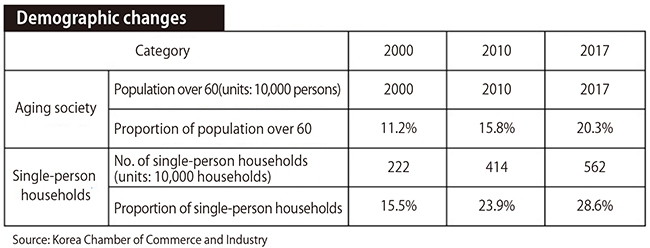Posted on : Dec.28,2018 11:55 KST
Modified on : Jan.2,2019 09:29 KST
KCCI identifies “convenient,” “cheap and close” and “enjoyment” as corporate strategies
The rapid emergence of senior citizens, people living alone, and value consumption as three major consumer market trends amid changing South Korean demographics has led to the suggestion of “convenient,” “cheap and close,” and “enjoyment” as corporate response strategies.
In a Dec. 23 report titled “Study of the New Consumer Market Landscape According to Demographic Changes and Related Response Measures,” the Korea Chamber of Commerce and Industry (KCCI, chairman Park Yongmaan) named the growing senior citizen market, rising consumption by single-person households, and increasing value consumption as new consumer market trends resulting from demographic changes.
The number of South Koreans over 60 passed 10 million for the first time last year, with the total of 10,420,000 people coming out to double the number in 2000.
“Whereas the senior citizens of the past often lacked the means for consumption, [the new senior citizens] have purchasing power and intent to spend and are adept at online shopping, which suggests potential for them to emerge of key consumers going ahead,” KCCI said.
“In the case of Japan, senior citizens have been driving changes in the market, maintaining similar consumption patterns to their active period in addition to the traditional senior citizen consumption areas in the healthcare and nursing industries,” it observed.
The percentage of single-person households also nearly doubled from 15.5% in 2000 to 28.6% in 2017.
 |
|
Demographic changes
|
“The traditional family consumption patterns of large purchasing at large-scale retail establishments is being replaced by single-person consumption and a preference for eating out and precooked foods,” KCCI said.
“As the percentage of single-person households in Japan has risen to 34.5%, sales have fallen for the department stores and supermarkets where family consumption typically occurs, and convenience store sales have risen sharply, particularly with convenience foods,” it noted.
KCCI also pointed to the emergence of new terms such as sohwakhaeng (“small but certain happiness”) and gasimbi (“consumption for satisfaction relative to cost”) as evidence of a “growing trend of people rejecting copying the consumption patterns of others and seeking out their own satisfaction.”
“In Japan, the recession-era marketing strategy of ‘small luxury’ has spread from the younger generation to senior citizens, and experience consumption has become established in the retail sales industry,” it said.
KCCI suggested three strategies in response to the changes in the consumer market: “convenience” for the senior citizen market, “cost-competitiveness and convenience in terms of distance and time” for single-person households, and “providing unique value and feeling” for value consumption.
By Kwack Jung-soo, business correspondent
Please direct comments or questions to [english@hani.co.kr]










